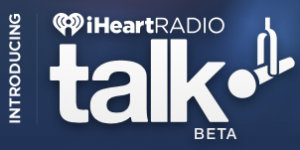 Clear Channel has discovered the podcast, apparently, but wants to rename it the “audiosode.” Rolls off the tongue, doesn’t it?
Clear Channel has discovered the podcast, apparently, but wants to rename it the “audiosode.” Rolls off the tongue, doesn’t it?
But don’t be fooled by the nincompoop neologism, this is a very serious move by the nation’s biggest radio broadcast company to dominate internet radio.
Those “audiosodes” are part of the iHeartRadio Talk beta that launched today, adding talk programming from well known hosts like Rush Limbaugh, programming from partners like ABC news and the Huffington Post, as well as shows from Adam Corolla’s podcast network.
American Public Media also has joined iHeartRadio and is offering programs like Marketplace and A Prairie Home Companion on the Talk platform. Live streaming stations from APM are now available on iHeartRadio, including Classical MPR and The Current.
iHeartRadio Talk gets even more podcasty via a deal with Spreaker, a platform for recording and distributing podcasts, though the company studiously avoids using the p-word word, just like Clear Channel does. Spreaker program producers can opt in to have their shows available on iHeartRadio. Those who do get a bonus of an upgrade to Spreaker’s “station” plan, which provides additional storage and unlimited live streaming of shows.
Stealing a page from Stitcher’s playbook, iHeartRadio Talk lets users create their own customized channel of talk
programs, or listen to curated channels on a variety of topics.
Given that iHeartRadio is the #2 streaming platform after Pandora, this addition of on demand talk programming is a big move right out of the Microsoft, Apple or Google playbook. Clear Channel is taking aim at the program segments currently owned by a variety of smaller apps and platforms looking to give iHeartRadio users fewer reasons to switch to a different app or site to find talk programming.
However, Clear Channel’s approach to distributing this content is very different than platforms like Stitcher or podcast listening apps. They rely on each individual podcast’s own RSS syndication feed to get updates, and episodes are streamed or downloaded directly from each podcast’s host server.
By comparison, for live streams iHeartRadio has partner stations and producers send their stream to Clear Channel’s servers for redistribution. The advantage for the broadcaster is that iHeartRadio listeners don’t soak up their valuable bandwidth.
It appears that iHeartRadio Talk programs are also stored and streamed from Clear Channel servers, which is one reason why the company has to strike agreements with program producers in order to store and redistribute programs and podcasts.
While this looks to be a good deal for producers, the risky side of this proposition is that distributing content via iHeartRadio means agreeing to Clear Channel’s terms. Right now the company is being quite agreeable, and does not appear to be demanding exclusivity from partners. Its goal is to bring as much content as possible under the iHeartRadio umbrella.
But let’s not forget that Clear Channel is the company that pioneered the type of radio consolidation that ruined much of commercial radio across the country.
It’s just a little ironic that a podcaster like Adam Corolla has signed on to iHeartRadio Talk, since he turned to podcasting after his eponymous syndicated morning show was cancelled by Infinity Broadcasting (now CBS Radio) in 2009. The host embraced podcasting because of the freedom it gave him compared to working for a major radio broadcaster.
Providing distribution to podcasters and other producers on iHeartRadio is not an act of benevolence, but an obvious strategy to consolidate programs and streams on Clear Channel servers, delivered on its own app.
Who want to bet that the company’s tune changes if it succeeds in making iHeartRadio the #1 online radio platform? What kind of terms will Clear Channel be able to demand if it becomes the Google of internet broadcasting?
It may be late to the party, but Clear Channel is underestimating the internet no more. Instead of becoming the producer of the best radio content on the air or online, the company is gunning to be the biggest aggregator and provider. It’s a strategy that has worked well for Google. But note that Clear Channel’s motto is not “don’t be evil” (regardless of whether or not one thinks Google has lived up to its famous motto).
What Clear Channel intends to do as it meets its goal is subject to speculation. But there is no doubt, consolidation is what Clear Channel knows best, and at this time it’s crystal clear that consolidation is the company’s plan for internet radio.


